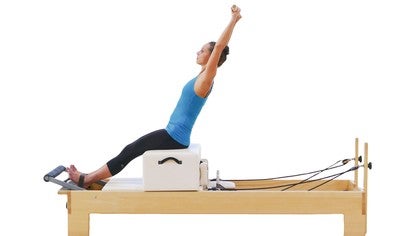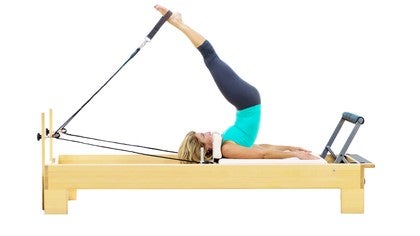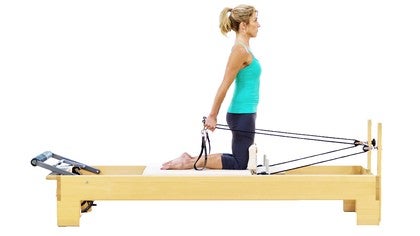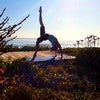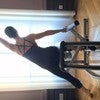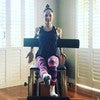Description
Muscle Focus: Abdominals.
Objective: Stabilizing the powerhouse and strengthening the abdominals.
Reformer Setup: Place all springs on to stabilize the carriage. Place the Longbox horizontally on the carriage, either over the shoulder blocks or just in front of them, depending on what your body needs. The footbar is down.
Start Position: Hook both ankles underneath the strap at the footbar. Sit tall on the box about a fist-distance away from the back edge. Chose one of two arm positions - either stack your forearms one on top of the other in front of the body in a "genie" position, or wrap your arms around your waist, with the hands at the hips.
Movement:
Roundback: Reach your tailbone to your heels, draw your abdominals to your spine, and roll back one vertebra at a time maintaining a c-curve in the back. Maintain that curve as you curl back up one vertebra at a time to return to start position.
Flatback: Keeping the legs in the same position as Roundback, hold onto the Wooden Stick with hands placed shoulder distance apart. Reach the arms straight overhead and grow tall and straight through the spine. Press the shoulders down towards the hips and send energy through your heels, activating the backs of your legs. Maintaining the flat back, hinge back on a high diagonal. Keeping the back flat and arms overhead, return to start position.
Tilt: Keeping the same straight back as in the Flatback and with the arms in the same position, lean forward slightly. Lean to the right, with a slight rotation and a subtle arch of the spine to the right. Keep the left hip pressed into the box. Return to center. Repeat to the left.
Twist: Keeping the same straight back as in the Flatback and with the arms in the same position, rotate the torso to the right. Hinge on a high diagonal to the right, keeping the spine lengthened, and the left hip pressing down. Return to center and repeat on the left. Repeat each variation two to four more times.
Tree: Place the wooden stick aside and unhook one foot from the foot strap. Clasp the leg behind the hamstring and sit tall with a flat back. Either pull the clasped leg towards the torso three times or bend and flex the clasped leg three times. Reach the leg straight, walk the hands up to the ankle, and roll back one vertebra at a time through the spine to lower the body down, stopping the leg when it reaches straight up to the ceiling at a ninety degree angle, and walking the hands down the leg as the body lowers down. Curl the chin towards the chest and roll through the vertebra one at a time to curl the body up, keeping the leg at ninety degrees and walking the hands up towards the ankle. Repeat three times on the same leg, and repeat then repeat the entire variation on the other leg.
About This Video
Transcript
Read Full Transcript
So continuing on with reformer exercises, just trying to take a little bit more time than you sometimes get in a class today or looking at the short box series and I'm going to give you five of the exercises. I'm not all variations but some variations on those five. This is a common piece that comes into the very basic classes. I'm a reformer and certainly carries on through the more advanced classes. So I've got Meredith here and you, we can look at this exercise or this series in a lot of different ways. We can look at it as really preparing the spine even more. Um, to go in all different directions. You're going to have some flection, some extension rotation and then a whole lot of stretching going on in between that, depending on what levels you go to.
So I'm just going to start walking you through the basics. Um, if you were to say muscularly, what are you really focused on? It varies piece by piece, but this first one and really all of them, I can say powerhouse and I do mean from shoulder to shoulder, hip to hip, abdominals back. But if you don't kick him, the hamstrings and the rest of the body, it's much harder and not quite as effective. So walking you through, we're using a balanced body reformer. Um, I've got Meredith under the foot strap here that comes with it and the springs are locked down. It's just so that the carriage doesn't move. Um, the height of a box can vary and, and I'll show you two different ways on this, on how to do it, but traditionally you legs are going to be straight for all of these exercises. Um, the first one we're looking at is the round back. So if I'm going to have a Meredith go two different arm positions, the first one just to show you better, we'll go arm over arm, forearm. And what she's doing here is pressing the top arm into the bottom arm and creating a little bit of resistance there.
I'm gonna actually have you push your elbows down a little bit and lift up through the chest even more. So there she just all tall ready to go. Her legs are extended and slightly apart, kind of pulling on the straps. Okay. As far as the box is concerned. Um, depending on which one you're using, it's either going to be over the shoulder rest or just in front of it. We know that we have it in front because we've measured out what works best from Meredith, and that's what you should do for yourself too. All right, so from here, just going through the mechanics of round back, making kind of a point of, oh, we're going to inhale on the exhale, she's going to draw her belly back and start to roll back. We won't go all the way. Go pretty far. Okay. And let your arms drop a little.
I'm going to stop her there. She could keep going, but we're not going to inhale. She's gonna use her legs. She's reaching long and exhale. She steaks stays curved until she's over her shoulders. And in this version, I'll just have her straighten up. I'm just giving you that sense of what's going to happen with the spine. As she rolls back. It's as if she sends energy through her feet, rounding back.
She could go further if she wanted to. Inhale and exhale. Keep the curve. That's the hard part. If you let go of the legs there, you're going to end up arching and then straighten up for a slightly different variation and little more classical. We'll take arm over arm at the hip bones. So now we're going to start round it right? She's through her legs still. She's rounded, she's got her back nice and open and it's the same action. She's gonna Unfurl her spine. Rounding back.
If you feel comfortable to go further, she can go all the way getting that extension too. Then Chin toward chest. She rounds stays curve the whole time. She'll inhale, squeeze the glutes and get up. Offer seat to exhale and roll back again. So it's this unfurling of the spine going only as far as you want, but ultimately all the way and rounding up. That one's a little flatter for you. Would you just one more, but we won't go all the way. I just wanted to get that up part coming around back. Good, good, good. And here's the real key.
Whether you go all the way or not is that you keep the curve as you come forward. So that's the round back. Go ahead and rest for a moment. Really focused on the center. Take your time with it. I'm going to show you a variation that works for I think all of them in moment, but we'll move on to the tilt. I'm sorry, flat back. So reach under and just grab the bar. And this one, I'm taking the bar about shoulder height. A shoulder distance apart. Separate them a tiny bit more actually. Yeah, and she's really got her shoulders reaching down into her back.
Her back is straight. I'm actually going to have you think of pushing the heels forward and slightly curving your back just a little. Just a little and now not quite somewhat right there from here. She's going to stay like that. She just inhales to hinge back. That's far enough.
Keeps it flat as she exhales and comes forward and go slightly in front of the hip bones. She recontract the glutes, pushes through, inhaling back, notice how strong and straight she is. An exhale and that's really far. You don't have to go that far as you're getting used to it again in him. Yeah. Even there and then just exhale and one more time. Now we're really strengthening those back extensors in conjunction with the ABS. Just rest the arms. The question may come a why even do these exercises, but this one is so obvious to me when when you're working the spine in a way that's it's stable, right?
We're looking for stable and stability and all of our exercises, but think of all those exercises we do like the plank, like the pushup, even teaser and all sorts of things where you really need to be able to engage the abdominals but also maintain some work through the back extensors in order to remain safe. So if we could just do two more repetitions, a flat back just to kind of have that in our minds and she's just inhaling. It doesn't have to be far, but she's in charge of exactly what's happening with their spine the whole time. Really key. One more time. Oh, a nice little adjustment. Let's move on to the next one is to tilt, so I'm going to have you lean forward ever so slightly. It starts the same. Otherwise, she's going to do a subtle rotation. To me.
Issue reaches out and what she's trying to do is maintain this opposite hip down. It's not real big exhaling center. She'll slightly rotate the other way, reaching that long, semi rotated spine and back to center. Good and inhale reaching and she's really stretched out. She can even add a subtle arch. Yeah, really getting a side stretch on that one. The opposite side. Right, and inhale up and over. A lot of times the arms are in the air. Well, one of the reasons I like the arms if you'll do two more is because you can kind of measure where you are.
Try not to let the arms get out ahead of you right there. Just measuring where you are in space. If that's too much and come back to center. You can also do it with all of these with the hands behind the head. If you didn't have a pole, you just two more. Just pull the ribs back a little.
You're almost, there we go. She's inhaling. This is also a great way. I find it even harder to cheat, but it's sometimes hard to tell exactly where you are in space. So that's the chill. Okay, the next one, we'll just keep your arms like that, but you could use a pole as well in the same upright position. It's the twist. So she's going to start by inhaling and rotating. She's going to lean way out, sort of a combination of the flat back. She exhales to come up in the rotation and back to center. Inhale to rotate.
He engine back and the opening is happening here at the hip again, she's going very far. You don't even have to demo that far. She's into it. Inhale. But this is perfect right here. It's still big and long, right? She's not arching to get further back. She's not looking down at the floor and rounding. She's maintaining. It's beautiful. Really pretty and up. And that's the twist. So stay there, relax or rest your arms.
So that's another one of those pieces where we have to be able to twist our spine. That's what we do in real life, right? So the more we can do that with the support and the stability and the anticipation from our brain to our body, the better. So that's what we've done. The round back, flat back tilt and twist already. Great time for climatory. Alright, I'm going to teach you the version that I learned and Meredith learned and then we'll show you the more common version. So, um, except for the straight bike. Yeah. Okay. So she's got her left leg and she's sitting tall.
And one of the things we like to think about is the back extensors because of the tendency to round back. So what she's going to do is x challenges, draw the leg toward the chest three times, but also growing taller. Three she maintains the length of her spine and stretches it up from here. She's gonna roll back until the tree. This is called climate tree. That's great. Stays about 90 degrees. She walks down the tree, one, two, three. She goes into extension either holding the leg of the box, she inhales and starts to walk back up, leaving the tree in place.
She sits back up trying to lead the leg nice and high. There's her inhale and start again. Exhale, pump three, two, one, maintaining as much as the long back there. As her inhale shoe starts to rock it back and exhales to walk down into the ball. You're rounding down into it, extend. Yup. Then curl the head up, walk up and you, you, you can use the arms but not a lot. Use the sense of your trunk, bringing you up.
Sit Tall again and we'll try the other leg. Just a couple. For this one I'm going to show you just the other version that's also common and that's where you're going to extend the leg three times and then we'll stay up. So now this time instead of holding on top or this is going to hold underneath and this is the more traditional way to do it is to kick the leg three times one down kick to kind of loosening up. Hold it up on three nice and high. She's going to come toward her leg on this one and now to go holding back, she's reaching with the opposite hip. The rest is the same. Take it down. You could still leave it up there at 90 good. And up she comes.
Notice she's, and she's gone. She can let the light come forward, but she's holding it as high as she can. Go ahead and stretch away forward this time. Yup. Then we just go again rock back. So you bringing it closer to you every time. Walk down one, two, three extend. And you're welcome to hold the box there, right?
Or the leg and up the one and two she climbs in each time she's going to get a little closer and that's the two to match that. So that's climate tree. So all of those, there's going to be different variations. I want to show you one option because not all of those are accessible to everyone. And I actually love this version for myself. So if you take my class, this is how I'm going to do it. Traditionally we do the straight legs and, and that's great and I'll do that too. But I, I know that this exercise is done more effectively.
If I can draw into the hamstrings of the back of the body too, and that's hard for me. So what I do is I would have my box the same way as Mary has it scooting way forward to the front edge to where the knees can be bent. Okay. And now they're together, right? So her legs are together, the strap is quite snug and her feet are just on the bar so that she's not going to try to lift them up of anything. She's going to try to engage the hamstrings by not by almost drawing the heels towards her glutes. Just very subtle. But that awareness is easier here. Let's just go do that first one again. Yeah, she's going to inhale and we'll all go back. Not all the way, but exhale to roll back. This is the round back. The first one.
So right here again, remember she could go all the way, but she has a sense of being able to draw her heels towards her boom glutes. But that allows the front of the body to kind of not overwork. It's a really nice thing to try and go ahead and sit up. Let's do one more exhale. So even now there's a subtle sense of push into the bar to get the back of the body working. That's fine.
Inhale now she can gently think of drawing the hills towards her and it just frees up the overworking of the hip flexors and then rest and that. That's a great tip on all of them. I think even climate tree that works really well. It's a fun series. Its happens to be one of my favorite. I think it is my favorite series and I hope that you'll try it, not be afraid of it, not feel like you have to do the full range. And um, see, you know how it fits into the rest of the exercises cause it really does.
It's a great exercise and that's why we start you with it right away in class. The short box series.
Return to Life - Playlist 2: Reformer Exercises
Comments
You need to be a subscriber to post a comment.
Please Log In or Create an Account to start your free trial.
